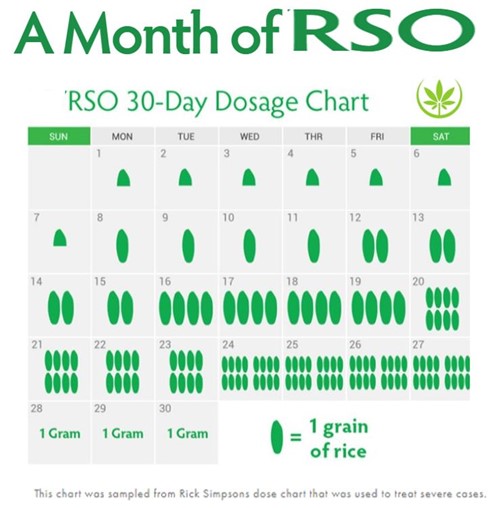Finding the Right Balance: RSO Oil Dosage Chart Explained
Introduction
RSO, or Rick Simpson Oil, has gained popularity for its potential therapeutic benefits. However, determining the right dosage can be a challenging task. In this article, we will delve into the intricacies of RSO oil dosage and provide you with a comprehensive RSO oil dosage chart to help you find the optimal balance for your needs.
Understanding RSO Oil
Rick Simpson Oil, named after its creator, is a concentrated form of cannabis oil known for its high levels of THC (tetrahydrocannabinol) and CBD (cannabidiol). It is typically used for its potential medicinal properties, which include pain relief, anti-inflammatory effects, and potential benefits for conditions like cancer, epilepsy, and chronic pain.
Factors Affecting RSO Dosage
Before we delve into the RSO oil dosage chart, it’s crucial to understand the factors that influence the appropriate dosage for an individual:
1. Tolerance Levels: Individuals with a higher tolerance to cannabinoids may require a higher dosage to achieve the desired effects.
2. Medical Condition: The severity of the medical condition being treated can influence the dosage. More severe conditions may necessitate higher doses.
3. Body Weight and Metabolism: Larger individuals with faster metabolisms may require higher doses to achieve the same effects as smaller individuals with slower metabolisms.
4. Product Potency: The potency of the RSO oil itself is a crucial factor. Different strains and extraction methods can yield oils with varying levels of THC and CBD.
5. Mode of Consumption: The method used to consume RSO oil (e.g., oral ingestion, sublingual, or topical application) can affect how quickly and intensely the effects are felt.
RSO Oil Dosage Chart
The following RSO oil dosage chart is a general guideline and should not replace personalized advice from a healthcare professional. It’s always recommended to consult with a healthcare provider before starting any new treatment.
| Condition | Starting Dosage (in mg) | Frequency | Titration |
|---|---|---|---|
| Chronic Pain | 2.5 mg | 3 times a day | Increase by 2.5 mg per week |
| Cancer-related Pain | 5 mg | 3 times a day | Increase by 5 mg per week |
| Epilepsy | 2.5 mg | 3 times a day | Increase by 2.5 mg per week |
| Anxiety | 2.5 mg | As needed | Increase by 2.5 mg as needed |
| Sleep Disorders | 2.5 mg | 1 hour before bedtime | Increase by 2.5 mg as needed |
Tips for Safe Consumption
- Start Low, Go Slow: Begin with the lowest recommended dose and gradually increase until you achieve the desired effects.
- Monitor for Side Effects: Pay close attention to any adverse reactions and adjust the dosage accordingly.
- Consistency is Key: Stick to a consistent dosing schedule to maintain a steady level of cannabinoids in your system.
- Consult a Healthcare Professional: Seek guidance from a healthcare provider, especially if you are taking other medications or have underlying health conditions.
Conclusion
Finding the right RSO oil dosage is a crucial step in harnessing its potential benefits for your specific needs. By considering factors like tolerance levels, medical condition, and body weight, and using the provided RSO oil dosage chart as a guideline, you can embark on your journey towards improved well-being with confidence and safety. Remember to always consult with a healthcare professional for personalized advice and monitoring.
You Might Also Like This:

